Mike Vardy's Blog, page 58
July 20, 2017
The Three Day Productivity Retreat Everyone Needs
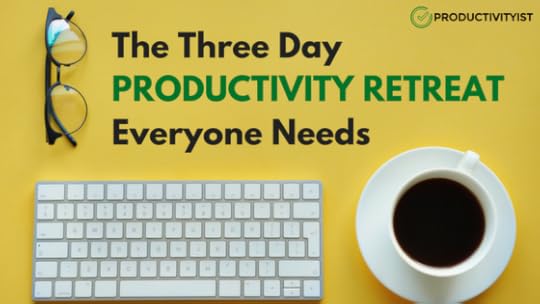
Today’s guest post is by Ryan McRae. Ryan is the creator of the blog, The ADHD NERD, a blog dedicated to helping people be more productive, successful and happy especially if they have ADHD.
I recently took a three-day productivity retreat—I noticed that I was falling behind on projects, freelance work, and my own writing and that I simply couldn’t catch up.
So I drove out to Chattanooga TN for a three day weekend of pure, adulterated productivity.
A lot of my writing friends have done this and they have wound up flittering their time away—wasted it on mundane, unimportant tasks.
So I developed a strategy that wouldn’t necessarily grant me immunity from those nagging to-dos, but instead use them to fuel my need to get a massive amount of writing done.
If you are going to embark on a three-day productivity retreat, you might not have an entire three* days to dedicate to it. You have kids, a significant other, or you raise bees perhaps. But I would suggest boiling this down into 4 hour dedicated hours a day for three days—it still can apply.
Before you start this journey, you will want to prepare. You are either going to do this off site at an Airbnb, a hotel room or your cousin Larry’s who is gone for the weekend. You have his spare key.
If you can’t get away and do it from home, I might suggest spending this entire time in your office, basement, or haunted attic.
You will also need to have on hand some important items:
A list of all the work you want to get done. Go deep on this list.
A wall calendar.
All the books you’ll need to reference.
Pens/paper/Sharpies.
Snacks (avoid carbs at all cost.)
Plenty of water and access to coffee.
A couple of chargers for your computer.
Notebooks!
Day One:
Today you are getting all the tasks that are small and tiny, the ones that bug you. The things you never get around to, but they are in the back of your head saying, “HEY HEY HEY HEY HEY!”:
Making a doctor’s appointment.
Making a dentist’s appointment.
Paying your bills.
Paying your taxes (or at least prepping them.)
Answering those seven emails you haven’t answered.
Writing out thank you cards you’ve put off.
Organize your desktop and throw out all those dumb pictures you keep around.
Organize your smartphone apps.
If you are at home on this retreat: clean out your closets, organize your drawers, clean out your junk drawer, dust and clean off your bookshelves, donate old clothes to charity.
Basically, you are actively doing what you would procrastinate on. Don’t get into Netflix or Hulu, but just keep in motion doing those micro-terrible tasks that you’ve been avoiding. Want to finally clean the washing machine—GO FOR IT.
You want to get all the tedium out of the way—all of it. Vacuum away, my friends. You do this so that you build up this nervous energy to get to work tomorrow. You are flipping the script on procrastinating. You are embracing these tasks you would normally run to. And even if you are sick of doing one of them, jump to something else that’s also annoying (organizing your sock drawer?) and get it done.
Day Two:
This is game time. This is where you batch what you want to work on. Either you are coding, writing, painting or whatever all day. All day. Get up early, fire up the coffee and get those fingers moving.
You are working on your big project. You have a checklist of all the stuff you want to get done. Get to it. When you complete something, check it off with a flourish and a barbaric yawp.
You want to work in 50/10 minute cycles. 50 minutes of work. 10 minutes off. That ten minutes off could be standing and stretching, taking a little walk, but it can’t at all resemble what you are working on. Your brain literally needs to experience something different. If you are writing on a computer, don’t switch to an article or a game—your brain has to know that you are taking a break.
For meals: eat something simple, healthy and not heavy. You don’t want to go into nap mode on this quest. Stick to proteins.
Keep going. Get another page, another canvas, another song completed. Perfection is the enemy of done. Get it done.
Day Three:
Big picture. Plan one week, one month, one year out around these areas: travel, financial, family, friendships, career, fitness. What do you want to have accomplished in these next months? Make some outrageous goals because this is the time you dream. Maybe you want to get out of credit card debt by a certain date. Maybe you want to have a collection of poetry ready for publication by May. Whatever it is, get it down on a calendar. Once you do, make those goals into a list:
Poetry Book Completed and Ready for Publication—May 15.
Completely Out of Credit Card Debt—July 15.
Two Poetry Conferences Attended—September 1st.
You want to have a list that is visible and reviewed so you can keep working on those goals. You don’t want it filed away and when another year rolls by it has collected dust (digital or analog dust.)
When you’re done with the retreat, review the list of all the things you’ve accomplished, from the small to the big. There may be a nagging sense that you haven’t gotten it all finished, that you still have ways to go and that’s fine. Before we start a long journey we get our lives in order, plan and determine the road that is before us. To help you on your journey, I’ve made a PDF that breaks down the process mentioned in this post.
The post The Three Day Productivity Retreat Everyone Needs appeared first on Productivityist.
July 17, 2017
Farsighted Focus with Eliot Wagonheim
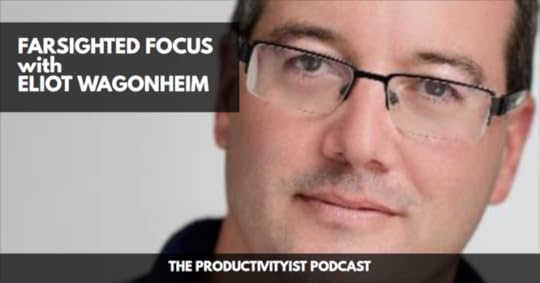
On this episode of the podcast, I am joined by Eliot Wagonheim, a lawyer and the author of Fire, Aim…Ready: Management. We talk about partnerships, setting boundaries, and even touch on how improvisation can help you in your business.
Some of the takeaways from our conversation include:
The four key questions you need to ask before entering into a partnership or agreement.
How to make contracts that really work through storytelling.
Why saying “no” is extremely valuable, and it is extremely positive for a business to be able to say it.
The importance of stepping back. I believe it’s incredibly valuable and sometimes I’ve been guilty of overlooking it, particularly when things get frantic. But I think you have to have a number of devices to do that.
Relevant Links:
Home – Farsighted Business
Farsighted Business Podcast
Fire, Aim…Ready: Management: The Start at the End Approach to Crushing Competition, Crafting Culture, and Cementing Relationships by Eliot Wagonheim | Amazon
Eliot Wagonheim (@Wagonheim) | Twitter
Read the transcript for this episode
Download the transcript for this episode
Thanks for tuning in! Until next time, remember to stop guessing…and start going.
If you’re interested in supporting the podcast and receiving exclusive content while doing so, you’ll want to check out the patrons-only version of The Productivityist Podcast on Patreon. Also, remember to leave The Productivityist Podcast a rating and review on iTunes, or on whatever platform you’re listening to. I read every single bit of feedback we receive. I want to make this show better and with your help I can do that.
The post Farsighted Focus with Eliot Wagonheim appeared first on Productivityist.
July 13, 2017
5 Ways Minimalism Helps You On The Path To Productivity
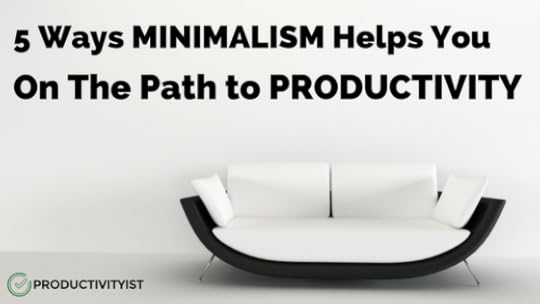
Today’s guest post is by Dan Erickson. You can connect with Dan on his website Hip Diggs where he gives you strategies to give you a more simple and peaceful life.
People who get things done are busy. Right? They have full schedules and balance multiple projects. They schedule and use every single second of their time productively. Wait. If that’s how you envision the path to productivity, you’re on the wrong path.
If you spend all your time being productive, you’ll likely fail in the end. My name is Dan Erickson, and I embrace a concept called minimalism. You might have heard of it. And you might be thinking, “Oh, you’re one of those weird people who live in a tiny apartment with exactly 101 material items.” You’d be wrong. You also might be surprised to find out that living simply is one of the best ways to create a clear path to productivity.
Here are five ways minimalism makes you more productive.
1. Living with less gives you more physical space to work.
You might envision the most productive people in the world in messy offices. They have a dozen projects going and stuff stacked everywhere. As a moderate minimalist, I keep my home and my work space simple and neat. I’m never buried in clutter even though I do juggle several creative projects. This spacious environment is not only physical but mental. It’s easier to produce new work on a blank page than on a page filled with clutter.
2. Minimalism frees up your financial resources.
When you choose to live simply, the path to productivity is an automatic benefit. Minimalism means less of everything: less house, less car, less stuff, and less bills. This frees up resources for your business. If you take your monthly outgoing bills down from $4000 to $2000 a month by living simply, you just created $2000 a month to use for your productive projects. That’s not bad. You could use that money to put back into your business, save for your kid’s education, or even go on vacation.
3. Less mess promotes thought and creativity.
Let’s talk about clutter. Clutter is not only physical. Clutter is also mental. And you’re much more likely to have a head full of mental clutter when your physical environment is cluttered. I recently attended a creativity workshop in NYC. One concept that was reinforced there was that sometimes the path to productivity is empty. A clear mind and a blank page are two of your best friends when it comes to starting a project. They allow you the freedom to choose to be productive and creative.
4. The minimalist lifestyle frees your schedule.
Minimalism is not only about having less stuff. It’s also about being less busy. You might think that being less busy runs contrary to being productive. You’d be mistaken. When you get rid of the non-essential busyness, things like TV, social media, and unnecessary meetings, you free up more time to be productive. But don’t get the wrong idea. Just because you have more time to be productive doesn’t mean you should squeeze work into every waking moment. Take purposeful breaks. Relax. Drink tea. Take walks. These things give you time and space to meditate on your work. In the end, spending less time working will make you more productive.
5. Minimalism leads to a less stressful life.
On top of all the other benefits that minimalism can bestow upon your productivity, it’s also good for your health. Having more space, more financial freedom, and an open schedule all help to reduce stress. Less stress can lead to more productivity. See how that works? By keeping things focused and simple, you get more done in the end.
There’s more to less than you might first think:
It’s funny, but when we really take the time to look at all the benefits of living with less, we find that we actually wind up with more. I’ve spent the last several years exploring the concepts of simple living and minimalism on my blog, Hip Diggs. I offer several resources that can help you understand how living simply puts you firmly on the path to productivity. Just go to the Hip Diggs’ start page for links to my ebooks: The Happiness of Simple, Get Back To Where You Are, and Finding Our Way Back Home.
Productivity is not a race. It’s a long slow process that works best when we keep things simple.
The post 5 Ways Minimalism Helps You On The Path To Productivity appeared first on Productivityist.
July 11, 2017
What Noticing Does
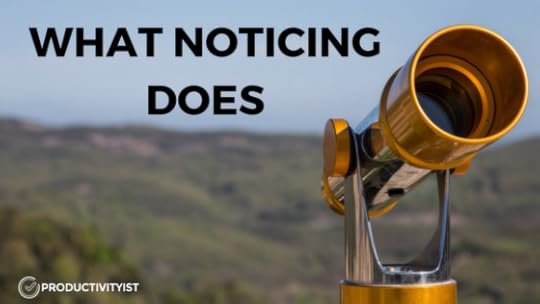
Whenever I sit down to plan, write, or create anything, I want to put myself in the best position to build something worthwhile. In order to do that, I think about all of the things I’ve been noticing up until that moment.
Here’s what this looks like when I’m writing something.
First Notice
When I started writing this piece, I remembered there was a book called The Noticer. I decided to dive into the internet to see what quotes I could find from it that might help reinforce my writing. That’s when I noticed this quote:
“Listen carefully to me. Despite popular belief to the contrary, there is absolutely no power in intention. There is no difference in the person who intends to do things differently and the one who never thinks about it in the first place. Have you ever considered how often we judge ourselves by our intentions while we judge others by their actions? Yet intention without action is an insult to those who expect the best from you.” ― Andy Andrews
This quote doesn’t mention noticing directly, but its message to me in noticing was two-fold.
I noticed the quote and it made me think differently about the direction I wanted to go with this article.
I noticed that the author’s ideas of intention mirror mine when I say that personal productivity is all about intention plus attention.
Noticing is the seed of decision-making.
You can notice something and decide to explore it deeper. If you’re going to do that, then you’re essentially making it an intention by deciding it deserves more of your attention.
Conversely, you can notice something and decide that it’s not worth more of your time. That means you have no intention to pursue it further.
Second Notice
I decided to explore the concept of noticing further. Once again, I began searching for quotes that would fuel the fire.
There were plenty of quotes about noticing, but it was difficult to find that could work with the theme of the work I do. I almost gave in, resolved that I’d be ending this piece a couple of paragraphs ago.
Then I found it.
“I think journaling is a key to success. You can set clear goals for yourself. You can start noticing repetitive behavior patterns and see the type of things that keep bothering you, and then you can have a bird’s eye view of it.” – Eric Andre
I’ve written about journaling many times. I’m a firm believer that the power of journaling is undervalued as a personal productivity practice. Journaling is all about getting out of your head what you have been noticing, be it daily or otherwise. When you take the time to write about the things you noticed going on around you – and the things going on inside – you can make sure your intentions are getting the attention they need to flourish.
Final Notice
I started to think about the idea of what happens you stop noticing. What would that do?
This quote jumped out at me – dying to be noticed – as that question rattled through my mind:
“One must always be aware, to notice even though the cost of noticing is to become responsible.” – Thylias Moss
When you notice something, you own what you do about it. If you do nothing, you are responsible for that. If you do something (no matter what that is), you are also responsible for that.
Here are some notable examples:
If you notice that you’re spending too much time sharing things other people noticed on social media, then you are responsible for whatever comes of that (good or bad).
If you spend some time journaling about you’ve been noticing, then you are responsible for whatever comes of that (good or bad).
If you notice that your family needs a holiday and you decide to cut back spending so you can make that happen, then you are responsible for whatever comes of that (good or bad).
If you spend time noticing every email that comes in your inbox and reacting through replying immediately to each one, then you are responsible for whatever comes of that (good or bad).
If you notice you’re spending too much time checking email and decide to limit that time accordingly so you can have more time for deeper, more focused work, then you are responsible for whatever comes of that (good or bad).
As long as we are alive, we’ll spend our time noticing things. What noticing does is it empowers us to make decisions that craft how we spend our time and how we shape our lives.
But what does noticing do for you?
Well, that’s really up to you.
The post What Noticing Does appeared first on Productivityist.
July 10, 2017
“At Least He’s Consistent”
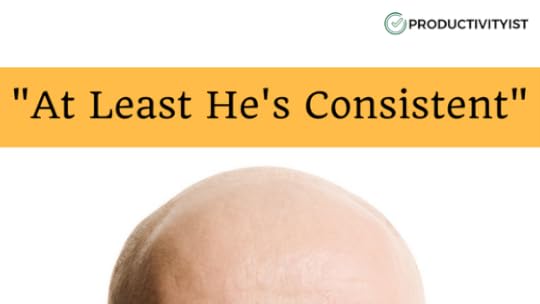
I’ve been following the work of Seth Godin for longer than I’ve been in the personal productivity game.
He was one of my first (and only) guests on the podcast I did as a productivity parodist. He was a gracious guest and played along nicely as I portrayed a faux productivity expert who preached the virtues of doing things “eventually.”
I don’t own all of Seth’s books. In fact, I own fewer than half of the books he has written. But I read his blog.
Seth posts on his blog daily. He’s done so for years. He doesn’t really do social media at all. He simply writes material for other platforms: his blog, his books, his other long-form work. (If you want to read about his writing process, then check out this article at Copyblogger. If you want to hear him talk about his writing process, then check out this episode of The Growth Show.)
Seth epitomizes consistency. He’s crafted this framework for how he operates, but it doesn’t feel limiting or rigid. It’s simple, and it’s durable because he’s fostered it over time. It doesn’t just allow him to ship. It allows him to deliver.
You may not be a writer like Seth, but you can certainly be as consistent with what you do as he is with what he does.
Being consistent is one of the simplest things you can do to build a personal productivity process you can trust. You can start with one thing – like writing a daily blog, for example – and let that take hold through consistency before you add another thing to the mix.
Not everything that Seth writes works for me, but he has more hits than misses, and that’s because he’s consistent.
Consistency can power so many things. Change. Happiness. Aptitude. Reputation. Growth. Efficiency. It can help you take charge of your time and your personal productivity.
And it can do so consistently.
The post “At Least He’s Consistent” appeared first on Productivityist.
Fearless and Free with Wendy Sachs
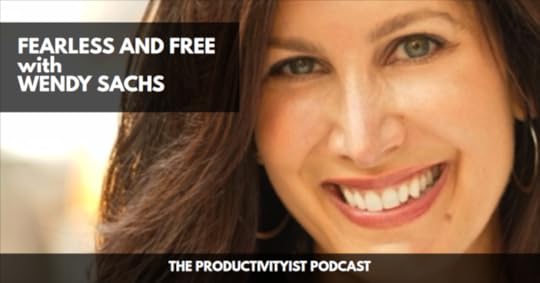
This week Emmy-award winning TV news producer, speaker, and author of the book Fearless and Free, Wendy Sachs joins me at the Productivityist Podcast. Wendy has also worked as a Capitol Hill press secretary, public relations executive, CNN contributor, content strategist, and editor-in-chief of Care.com.
Tune in as we talk about careers, career change and ways you can move forward in your own career.
Some of the takeaways from our conversation include:
Thoughts on the role fear plays in career change.
The importance of finding the right environment for you to thrive.
How you can take action and move forward today.
Relevant Links
Wendy Sachs | Website
Fearless and Free: How Smart Women Pivot–and Relaunch Their Careers by Wendy Sachs | Amazon
How She Really Does It: Secrets of Successful Stay-at-Work Moms by Wendy Sachs | Amazon
Wendy Sachs (@wsachs) | Instagram
Wendy Sachs (@wsachs) | Twitter
Read the transcript for this episode
Download the transcript for this episode
Thanks for tuning in! Until next time, remember to stop guessing…and start going.
If you’re interested in supporting the podcast and receiving exclusive content while doing so, you’ll want to check out the patrons-only version of The Productivityist Podcast on Patreon. Also, remember to leave The Productivityist Podcast a rating and review on iTunes, or on whatever platform you’re listening to. I read every single bit of feedback we receive. I want to make this show better and with your help I can do that.
The post Fearless and Free with Wendy Sachs appeared first on Productivityist.
July 7, 2017
Near-Wins

Sara Lewis, author of The Rise, once observed the Columbia University women’s archery team for several hours. Through her time with the archery team, she was able to draw some comparisons between success and mastery.
”Success is the ability to hit that ten ring once but mastery is the ability to know that means nothing if you can’t hit it again and again. And this is what distinguishes someone being successful in their career…and really being a master. But what it takes is an appreciation for your near-wins.” via Business Insider
There’s no doubt that when the members of that archery team first picked up a bow that they struggled to come close to the target, let alone get a bullseye. The same applies to you when you try something for the first time, like putting together a “doable” to-do list for your week or working to improve your focus for extended periods of time.
But then you get closer to the target (whatever that may be). The list gets easier to do, and you can focus a little longer every time you try. Every time you do this, you get better bit by bit.
If you want to move forward then you need to appreciate your near-wins. Near-wins are important. They mean you’re getting closer to mastery.
One more thing: if you want to keep tabs on your near-wins, then the best way to do that is through journaling. I’ve put together a free journaling challenge to help you celebrate your small and near-wins. You’ll get a daily email over a ten day period that will help you notice your near-wins and build a journaling habit in the process. It’s a challenge that is full of wins! Ready to get started? CLICK HERE and you’ll be on your way.
The post Near-Wins appeared first on Productivityist.
July 6, 2017
Signals vs Triggers
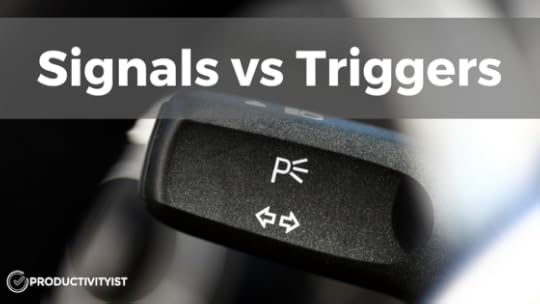
I’ve written about triggers before, but I’ve yet to write about signals.
Signals are different than triggers. Signals are indicators that something needs to happen, and triggers are the incidents that make things happen. Signals often come in waves, sometimes one after the other. Other times, signals are spaced far apart. Triggers show up once and lead to action.
I can’t walk through a bookstore right now. Why? Because I see the published works of many people I know, and it reminds me that I don’t have any sort of publishing deal in the works. It’s not that I couldn’t have one, it’s that I don’t have one. Seeing those books acts as a signal. But a while ago, I saw one book in particular that acted as a trigger. Now I’m finally working on my book proposal.
I don’t really record signals in my journal entries. But I do record triggers. So when I saw that particular book, I wrote about it in my journal that night. In fact, that’s the only place where I have written down the title of the book and the name of the author. (I won’t be sharing that in writing anywhere else.)
A signal could be seeing your email pile up, but a trigger could be seeing a specific email that propels you to take action on your overflowing inbox.
You need to pay attention to both signals and triggers because they will ultimately help you make progress on your intentions. If you ignore the signals, the trigger won’t be worth noticing. Ignore the trigger, and the outcome you want may never amounts to anything worth celebrating.
If you ignore both, then you won’t do much of anything at all.
The post Signals vs Triggers appeared first on Productivityist.
July 5, 2017
43 Bullet Points on Personal Productivity
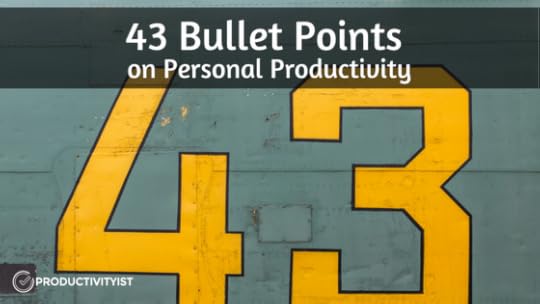
I’ve put together these bullet points on personal productivity to celebrate my birthday. That’s why the number is so odd.
You may even find some of the points themselves odd, but if you find one that you think would be worth adding to your own approach, then I’ll consider it a gift both given and received.
You have time for whatever you want to have time for. If it matters, make time for it that allows you to make progress with as little friction as possible.
Leave a bottle of water where you’ll drink it first thing when you wake up. (I leave mine in the bathroom.)
Use less tools so you can use them to their fullest.
Take one day off a week from social media. If you feel the need to post daily, then schedule one day’s worth in advance.
Find a way to meditate and then do it. It’s worth it.
You can find really good decaffeinated coffee. When you find one, start drinking it more than your caffeinated stuff.
Never forget to turn on your email vacation message…and preferably do so the day before you go on vacation. And be sure to send this email before you leave for vacation.
Don’t take your lunch breaks at your desk.
Always keep a set of workout clothes packed in your suitcase.
Journaling is an underrated productivity practice. It’s also undervalued.
Paper books are still the best type of books.
Using an email program that separates your personal and work email is a wise move if you find yourself checking personal email at work and work email during personal time.
Your calendar outlines the broad strokes of your day. Your to do list dives into the details. You need both to be able to pay attention to your intentions.
Getting by on 33 articles of clothing over a three-month period isn’t as tough as you might think.
Buy a portable battery to charge your mobile devices. You’ll need it someday.
If you’re a Mac user, start using tags today. You’ll thank yourself for it later.
Keep a book on the same table where you keep your TV remote control. It’ll increase your chances of reading instead of watching.
Sleep Cycle and similar apps are way better for you and your sleep than a basic alarm clock.
Mind maps still work best on paper or on whiteboards.
It’s okay to have some guilty pleasure apps that don’t offer the same streamlined features as others. Example: I use Hanx Writer from time to time because I love the typewriter sound it makes. It’s not as fully featured as Byword or Scrivener, but that’s okay. If I need to, I’ll copy and paste my text into one of those apps. It’s an extra step, but for that clickety-clackity sound, it’s worth it.
Delegate as much as you can if you can. Think beyond work for this, too. A Roomba can vacuum for you so you can spend more time on something you really enjoy (and perhaps even earn money by doing it).
Night owls can be just as productive as early birds.
Set aside one day of the workweek when meetings aren’t a thing you do. You really need to do this.
Even though it may take longer to get to where you’re going, spend time walking or biking places. Productivity is not about speed for speed’s sake.
A wall calendar can offer you a bird’s-eye view of your year at a glance. If you’ve got the space for it, get one.
If you’re going to watch television, plan for it. Record programs. Watch them on your time, not on the time of the networks.
Be deliberate with your devices right from the beginning. Own them and don’t let them own you.
Slowing down can be more productive over the long run than speeding up.
Even the littlest thing that needs to happen regularly should be on your to do list if it matters. Don’t let it take up bandwidth in your brain.
Using a service that allows people to schedule time with me was one of the best things I ever did. It’s easy to do and saves more time than you think.
No matter what platform or computer you use, finding a text expansion app is totally worth the time it’s going to save you.
“Watch later” is my favourite button on YouTube. It should be yours, too.
Setting aside time to learn daily is one of the wisest investments of your time you can make.
Leverage the time when doing the dishes or working out by listening to something like an audiobook or a podcast.
Looking for a habit to start an evening routine with? Flossing is a great option.
The Instant Pot is worth every nickel.
I think tracking your time is worthwhile as long as you don’t overdo it. (I use Life Cycle and the ZEIº by Timeular. I suppose the Health and Activity apps on iOS also count.)
Don’t forget the value of qualitative data when tracking your time. That data helps shape the story, too.
Work from home? Mix it up and head elsewhere a couple of times per week (I do on Tuesdays and Thursdays).
Don’t forget to get outside. (And if you work from home try to create a space to work outdoors. It’s worth the effort and expense.)
I haven’t gone out to buy shaving needs in years because they come in the mail. I’m saving time and money as a result.
Fac, si facis. That’s Latin for “Do it, if you’re going to do it.”
If you feel like you wasted time, you probably have. Make note of when you have this feeling so you can stop wasting this non-renewable resource of yours.
The post 43 Bullet Points on Personal Productivity appeared first on Productivityist.
July 4, 2017
The Little Things That Get in the Way
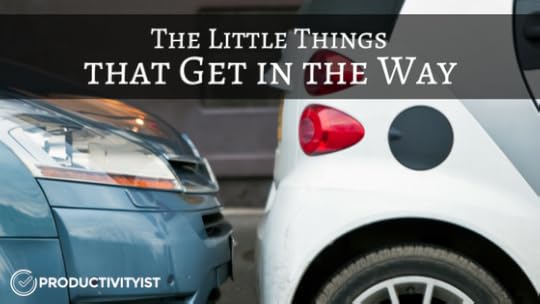
We don’t have much parking available on our street anymore. All of the spaces have been taken up by tenants of homes in the neighbourhood and visitors overnighting more than ever before. Our driveway slants in such a way that getting in and out of our car is nearly impossible when we’re parked there, so we have parked on the street in front of our house for over a decade.
More and more often these days, finding a space in front of our house has become a crapshoot.
Whenever I come home from driving somewhere and someone is parked in “our space,” I get a little bit angry. I shouldn’t really get angry at all. It’s not as if we own that space. But since we moved in, it has been the space we’ve parked in more often than not.
I look out the window every once in a while, and sometimes I see another car parked there. I get a little bit angry again. I know I shouldn’t, but I do.
It’s little things like this—the perceived injustice of a parking space being taken away—that get in the way of bigger things. I’ve spent a lot of time mapping out how I might talk to the tenants in the house next door when I see them parking in our spot. What does that confrontation look like? Will it be amicable? Will they adhere to my wants? Will they ignore me and walk away? How would I handle any of those scenarios?
You know what I could have done instead of that kind of deliberation? Written more. Read more. Played with my kids more. Heck, anything that has a bigger impact more.
The little things you have in your life won’t be the same as the ones I have in mine. But they are there. Don’t let them get in the way. They are so little that they should take up as little time and space as possible.
I’m going to park bigger—and better—things in those spaces from now on and spend time monitoring them instead. I encourage you to do the same.
The post The Little Things That Get in the Way appeared first on Productivityist.



